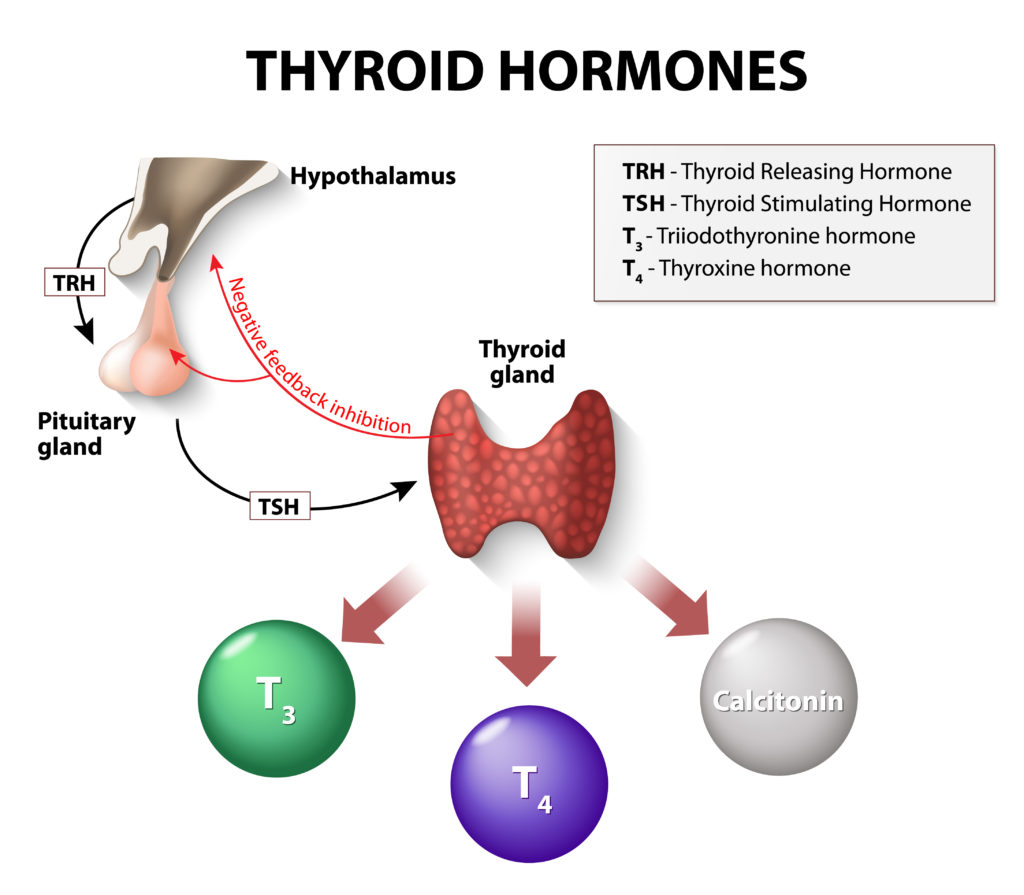Thyroid Treatment
Feel Fully Alive Again with Personalized Thyroid Treatment
Do you feel frustrated because you’re gaining weight without an explainable cause? Are you exhausted most of the time? Do you have mood swings or brain fog? Are you cold when others aren’t? You may be suffering from a thyroid disorder.
Perhaps you’ve been previously diagnosed with thyroid issues, but no treatment has worked. Or maybe you’ve never been properly diagnosed. In either case, there is hope: our personalized thyroid treatment can help you return to a feeling of vibrant energy and aliveness.
Understanding the Thyroid
 The thyroid is a butterfly-shaped gland in the lower front of your neck, below the Adam’s Apple. The thyroid releases hormones into the bloodstream. These hormones are then carried to every organ in your body to control metabolism and regulate body temperature.
The thyroid is a butterfly-shaped gland in the lower front of your neck, below the Adam’s Apple. The thyroid releases hormones into the bloodstream. These hormones are then carried to every organ in your body to control metabolism and regulate body temperature.
The thyroid hormone regulates vital body functions, including breathing, heart rate, nervous system, body weight, muscle strength, and cholesterol levels. So a poorly functioning thyroid can bring on an array of symptoms: feeling cold when others don’t; feeling weak, sad, or depressed; being tired when you’ve had plenty of sleep; gaining unwanted weight; and various other symptoms.
T3 is THE active thyroid hormone in the body. T3 is, therefore, the most basic rate-limiting factor for energy production in our cells. Research shows that most people over the age of 50 are deficient in T3, and lack of T3 has been implicated in many chronic disease states.
Together with cortisol from the adrenals, our mitochondria depend upon T3 and cortisol to aid in fat breakdown and provide our cells with maximum energy. T3, therefore, is NECESSARY to maintain mitochondrial health and survival!
What is Hypothyroidism?
When your thyroid gland can’t make enough hormone for your body’s needs or isn’t properly utilizing the hormone, this is known as Hypothyroidism. A nonfunctioning thyroid gland can produce Hypothyroidism. It may also be caused by a non-functioning pituitary gland or by the destruction of the thyroid gland by radiation treatment or surgery.
Some of the common symptoms of Hypothyroidism include:
Fatigue or lack of energy
Weight gain
Can’t lose weight
Dry, coarse hair
Dry skin
Hair loss
Cold intolerance
Cold hands and feet
Muscle cramps
Frequent muscle aches
Constipation
Weakness
Depression
Irritability
Memory loss
Abnormal menstrual cycles
Decreased libido
Hahimoto’s Disease
Hashimoto’s Disease, an autoimmune disorder, is the primary cause of Hypothyroidism. With Hashimoto’s, your immune system attacks your thyroid. As a result, the thyroid becomes damaged and can’t make enough thyroid hormones.
Symptoms of Hashimoto’s Disease may include swelling at the front of your neck (goiter), and the signs commonly associated with Hypothyroidism, listed below:
Fatigue and sluggishness
Increased sensitivity to cold
Constipation
Pale, dry skin
A puffy face
Brittle nails
Hair loss
Enlargement of the tongue
Unexplained weight gain
Joint pain and stiffness
Depression
Irritability
Memory loss
Abnormal menstrual cycles
Decreased libido
Hashimoto’s Disease is far more common in women than in men. The disease most often appears between ages 40 and 60 but can also occur in teens or young women. You are more likely to develop the condition if you have other autoimmune disorders or if other family members have Hashimoto’s.
Because Hashimoto’s is an autoimmune disease, thyroid medication alone isn’t enough to treat it successfully. It’s important to test thoroughly for anything that could be causing this disease.
How does Thyroid Hormone Treatment Work?
In Replacement Therapy, we use hormone treatment to replace the function of the thyroid when it’s not functioning normally.
The goal is to get the thyroid to function as close to normal as possible through supplementation that works the same way your body’s thyroid hormone would. The only concerns with taking thyroid hormones are taking too much or too little, but close monitoring by your physician will ensure this doesn’t happen.
Dr. Wood and her team are here to help you achieve an optimal state of hormonal balance so that your quality of life is the best it can be. To do that, we will create a comprehensive, integrated, and regularly monitored plan designed uniquely for you.
This process takes time and dedication, and we will be with you every step of the way to support you in your journey to optimal vitality.
Hyperthyroidism
Hyperthyroidism is the opposite of Hypothyroidism. It’s caused by the thyroid gland secreting too many T3 and T4 hormones. Symptoms of Hyperthyroidism may include:
Rapid heart rate
Increased anxiety
Weight loss
Panic attacks
Irritability
Tremors in the hands
Hair loss
Muscle aches
Shortness of breath
Difficulty sleeping
Excessive sweating
Infertility
Erectile dysfunction
Heat intolerance
Irregular menstrual cycles
Frequent bowel movements or diarrhea
Often these symptoms are misdiagnosed as cardiac disorders or anxiety issues. Treatment for Hyperthyroidism is complex, and we recommend you see an Endocrinologist if you have any of these symptoms.
Could you have a thyroid issue? Take this quiz.
How many of these can you answer YES to? And are they moderate or severe?
Anxiety
Brittle, splitting fingernails
Cold intolerance
Constipation
Depression
Dry or coarse skin
Fatigue
Hair Loss
Heavy menstrual flow
Migraines
Missing outer 1/3 of eyebrows
Muscle or joint aches
Poor concentration
Bad memory
Poor motivation
Water retention
Weakness
Weight gain (10 pounds or more within three months)
If you ranked three or more of the above issues as Moderate or Severe, you might be suffering from thyroid issues.
Our Philosophy
We provide a vision and a plan for your long-term health and wellness.
Dr. Wood utilizes a wide variety of testing and treatments to restore your health.
Please note that Dr. Wood does not serve as your primary care provider, and we ask that you please maintain your current relationship. She does, however, look for underlying root causes of symptoms and is an expert at diagnosing and treating them. Because of this, her services are the perfect accompaniment with your PCP!
Contact our New Patient Coordinator
Call us for a consultation to see how we can help. We’ll answer any questions you have and explain our treatment approach, protocols, fees, and options. Or fill out the contact form below, and we will contact you at a time that is convenient for you.
New Patients Call: 972-214-5641
Contact Us by filling out the form below.
"*" indicates required fields




